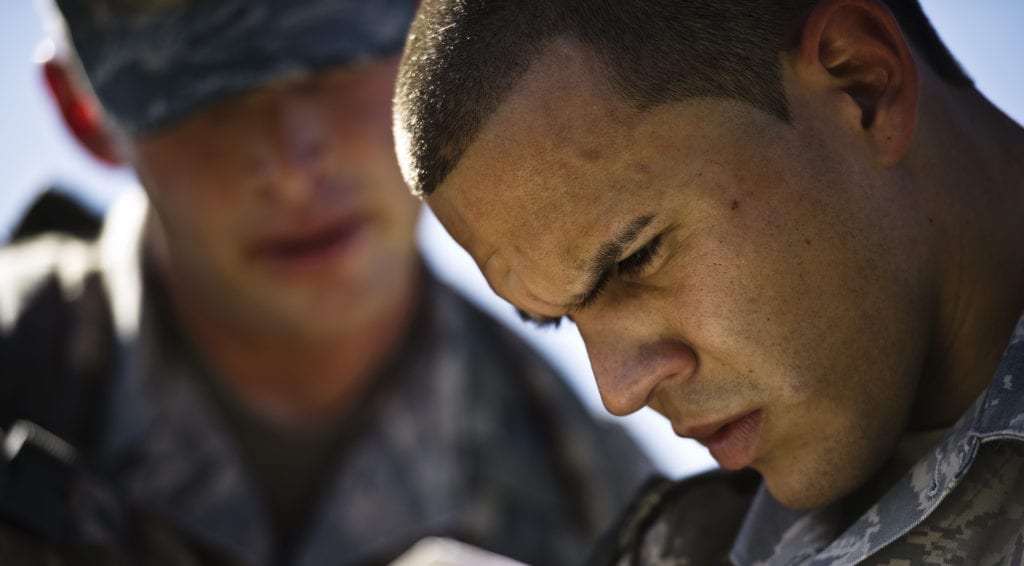Tempted to Give Up
It has been said that “stress is the spice of life; we just don’t want to get over-spiced.”
Today many have become ‘over spiced’ and the impact has been negative. Too many people are giving up, and some of them belong to the military community. Don’t be among that number of those who allow themselves to be overwhelmed and just throw in the towel. You can make it!
Facing Stress
Given the ten years of war in Iraq and Afghanistan, the military community has been at the tip of the spear when it comes to facing stressful situations. The cumulative negative effects have been wide-ranging and widespread from the battlefield to the home front. Warriors represent the group most affected, but it hardly stops with them. Spouses, children, relatives, friends, community members all have felt the effects of stress to varying degrees.
 This article deals with the negative impacts of stress and attempts to highlight a few of the most common effects. There are many more, but it will help us to make some general observations that apply to most situations. Obviously the most commonly used terms related to stress on the battlefield are Post Traumatic Stress and Post Traumatic Stress Disorder. It is well documented that many of our service-men and -women have experienced stress associated with combat. Research continues to explore the causes and treatments. But it would be a mistake to lump too much in with PTS/PTSD. As we’ve said before, stress is universal.
This article deals with the negative impacts of stress and attempts to highlight a few of the most common effects. There are many more, but it will help us to make some general observations that apply to most situations. Obviously the most commonly used terms related to stress on the battlefield are Post Traumatic Stress and Post Traumatic Stress Disorder. It is well documented that many of our service-men and -women have experienced stress associated with combat. Research continues to explore the causes and treatments. But it would be a mistake to lump too much in with PTS/PTSD. As we’ve said before, stress is universal.
There are plenty of signs telling us that US society is not handling stress well. Ironically, I believe that some of our so-called stress relievers are actually compounding the problem. Remember. Stress is nothing new. It’s as old as mankind. Though we are constantly finding out new things through research, the Bible has many things to tell us that don’t represent recent discovery. These are truths that applied in the past and continue into the present.
Elijah Tempted to Give Up
Take the story of Elijah at Mount Carmel. It provides a fascinating account of a brave warrior standing up to a seemingly impossible challenge. At the same time, it demonstrates the frailty of mankind when we reach our limits- and everyone has limits.
By the 9th Century BC Israel had divided into the Northern and Southern Kingdoms. The Northern Kingdom consisted of 10 tribes that largely had abandoned the worship of Yahweh and began worshiping the pagan gods of Baal. The reigning king of the Northern Kingdom was a man named Ahab, an evil king. His wife, Jezebel, was a woman from Phoenicia steeped in pagan worship and who financially supported hundreds of Baalist priests and prophets. Along comes Elijah, a prophet of God. In an attempt to combat false religions, he challenged 450 prophets of Baal and 450 prophets of Asherah to a contest to determine whose God really had power. He challenged the people of Israel to choose whom they would follow- Baal or God.
The Contest
The contest consisted of building two altars and placing a sacrificial animal on each altar. The god who answered by fire would be acclaimed as the true God.
The prophets of Baal went first, calling out to their gods and dancing before the altar. As the hours passed, some even slashed themselves with swords and spears. There was plenty of blood. But fire never came. As evening approached, Elijah continued to taunt them in a loud voice. The Baalist prophets exhausted themselves. But there was still no fire.
Elijah’s Turn
Elijah fixed the altar of the Lord, adding twelve stones to it, one for each of the tribes of Israel. Then he dug a trench around the altar, piled wood on it, and placed pieces of a bull to be used as the sacrifice. Finally, he poured large jars of water on the altar. He repeated this twice more.
Now, the moment of decision. Praying to the Lord, Elijah concluded his prayer: “Hear me, O Lord, hear me, that this people may know that You are the Lord God, and that You have turned their hearts back to You again,” (I Kings 18:37, NKJV).
 Talk about setting himself up-if God chose not to answer Elijah’s prayer, he was toast. He was outnumbered at hundreds to one.
Talk about setting himself up-if God chose not to answer Elijah’s prayer, he was toast. He was outnumbered at hundreds to one.
But God did answer Elijah’s prayer, immediately and by fire. The fire consumed the sacrifice, the wood, the stones, and the water.
All present cried out in unison, “The Lord, He is God! The Lord, He is God!” (1 Kings 18:39).
What happened next was not pretty. Elijah ordered the 450 prophets of Baal to be taken to the Kishon Valley and slaughtered. This action would quickly have consequences for Elijah. As soon as King Ahab told Jezebel about the slaughter, she sent a message to Elijah announcing she would have him killed in the next 24 hours. By this time, Elijah felt exhausted.
Dealing with Stress
“And when he saw that, he arose and ran for his life, and went to Beersheba, which belongs to Judah, and left his servant there. But he himself went a day’s journey into the wilderness, and came and sat down under a broom tree. And he prayed that he might die, and said, “It is enough! Now, Lord, take my life, for I am no better than my fathers!” (1 Kings 19:3,4, NKJV).
The stress and strain of his encounter with the false prophets had taken its toll- mentally, physically, emotionally and spiritually. Jezebel’s message triggered fear in Elijah’s heart and his first instinct was to run. He ran to Beersheba in Judah, and leaving his servant there, traveled a day’s journey into the desert. The adrenaline rush that propelled his initial flight was over. He was running on fumes. Elijah came to a broom tree and collapsed. He then prayed to the Lord. Notice the contents of his prayer. First, he said, “It is enough!” Who among us can’t identify with that statement? Can you remember feeling that way and repeating almost those exact words? The stresses and pressures of life can close in on us like walls. We get to the point where we feel we can’t take it anymore. Something has to change.
What happens after those feelings hit you?
In Elijah’s case, we know exactly what happened. He continued his prayer, “Take my life, for I am no better than my fathers!” Do you realize who this man was and what he was saying here? Elijah was a great prophet of God. The Lord had just used him to win victory over hundreds of false prophets. It is hard to imagine how Elijah could have been more bold or courageous for God. But he had reached his limits.
Finally, in asking God to take his life, Elijah made a confession- and it was the truth. He realized that he was a mere mortal, a man no better and no worse than those who had gone before him. He realized that he was a frail and weak human being subject to the same vulnerabilities as other men. Fortunately for Elijah, the story doesn’t end here. Read the rest of Chapter 19 for yourself. An angel visits Elijah, feeds him, and tells him to go to Mount Horeb to meet with God. At Horeb, God speaks to Elijah and helps the exhausted prophet to regain his strength, his perspective, and his faith. Elijah is able to regroup and continue his ministry as a prophet.
Lessons to Learn
Let’s apply a few things from Elijah’s life that can help us deal with tough times.
First, sooner or later most people will encounter stress that threatens to overwhelm them.
If you are associated with the military, that time will probably happen sooner. So don’t feel like you’re the only one who has ever felt this way.
Secondly, Elijah let his feelings govern his response to the situation.
For a brief time, he simply lost his head. He also lost his perspective. His hope tank registered empty. In this context, he asked God to take his life. Most of us, if we are honest, have been at this same place. We’ve wondered why life is so hard. We have thought that continuing to live isn’t worth the pain. We may have contemplated suicide and even started to make plans.
Thirdly, what stresses you to the point of giving up may not be what stresses someone else.
We’re all different. You may be thinking, “I can handle a firefight or an explosion from an IED (Improvised Explosive Device), but this marriage thing is driving me insane.” Continuing further, you deal with a lot of hard stuff, but somehow it seems like little things are driving you over the edge. Bottom line: it really doesn’t matter what causes your stress.
Sooner or later most people will encounter stress that threatens to overwhelm them
The point is that you have to decide that you will not give up. Never. Just as God came to Elijah’s rescue by sending an angel, He will come to your aid as well. God helped to restore Elijah’s strength and perspective, He can do the same for you. Let faith arise within you. Make up your mind now that you and God together can deal with any situation that will happen. Finally, determine that no matter how tough things get, you will not give up. If you learn to approach life with this outlook, you’ll discover that fear will melt and your faith will grow. Your joy and zest for life will increase as well. And that’s just the way the Lord wants it.







